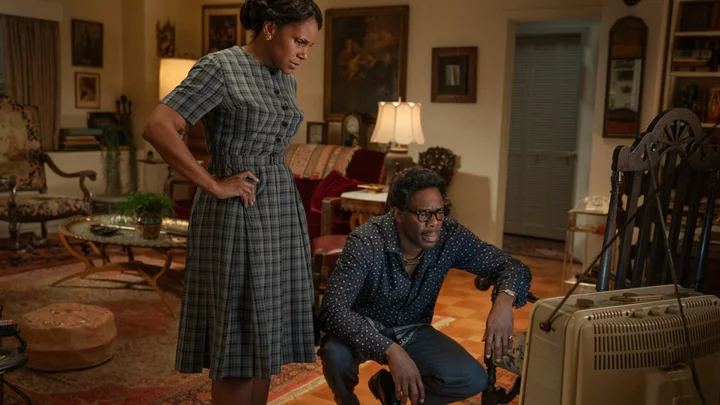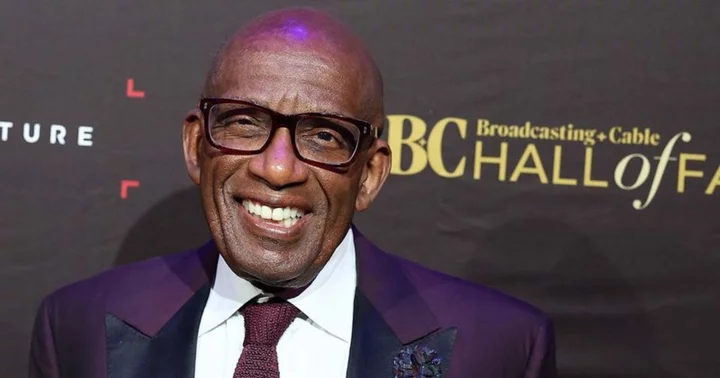
Amazon's Echo Show 15 is a smart hub for connected homes
It’s time for me to come clean. While I’m fully on board with smart devices
2023-07-12 23:47

'GMA' host Michael Strahan's twin daughters Sophia and Isabella surprise dad with sweet Father's Day tribute
Michael Strahan's twin daughters Sophia Strahan and Isabella Strahan shared their childhood photos to mark Father's Day
2023-06-19 11:21

Netflix's 'Rustin' biopic trailer sees Colman Domingo as the legendary civil rights leader
We've seen a glimmer of it, now the whole trailer is here. Netflix's upcoming biopic
2023-10-19 21:54

This US couple sold their house and moved to Italy for good
The travel bans of the pandemic caused Glenda and Randy Tuminello from Washington State to reevaluate their lives -- and retire to southern Italy. Here's how they got on.
2023-11-13 22:52

Build your writing chops with a Grammarly Premium Plan — for 50% off
Save up to $15/month: As of October 19, all Grammarly Premium Plans are on a
2023-10-20 00:17

Today’s beloved meteorologist Al Roker goes missing from NBC show after hinting at retirement on-air
Al Roker's co-host Craig Melvin updated the fans about his whereabouts
2023-08-22 11:45

F1 2023 calendar: Every race this season
The 2023 Formula 1 season is here and the new campaign has seen Red Bull pick up where they left off in 2022. This year sees 23 races held in a record-breaking calendar, as Max Verstappen looks to make it three in a row following back-to-back World Championship triumphs. Lewis Hamilton and his Mercedes team have found further improvements so far this year following a disappointing 2022 season. Meanwhile Ferrari are struggling to match their strong start to 2022. There are new faces on the grid too - such as Oscar Piastri and Nyck de Vries - and all 20 drivers will be itching to get back on track after a three-month break with the official pre-season test in Bahrain before the first race of the season a week later. Here is everything you need to know. What is the 2023 F1 calendar? ROUND 1 —BAHRAIN Bahrain International Circuit, Sakhir - 3-5 March ROUND 2 - SAUDI ARABIA Jeddah Corniche Circuit - 17-19 March ROUND 3 - AUSTRALIA Albert Park, Melbourne - 31 March-2 April ROUND 4 - AZERBAIJAN (sprint weekend) Baku City Circuit - 28-30 April ROUND 5 - MIAMI Miami International Autodrome, Hard Rock Stadium - 5-7 May ROUND 6 - EMILIA ROMAGNA CANCELLED Imola Circuit - 19-21 May ROUND 7 - MONACO Circuit de Monaco - 26-28 May ROUND 8 - SPAIN Circuit de Barcelona-Catalunya - 2-4 June ROUND 9 - CANADA Circuit Gilles Villeneuve, Montreal - 16-18 June ROUND 10 - AUSTRIA (sprint weekend) Red Bull Ring, Spielberg - 30 June-2 July ROUND 11 - GREAT BRITAIN Silverstone Circuit - 7-9 July ROUND 12 - HUNGARY Hungaroring, Budapest - 21-23 July ROUND 13 - BELGIUM (sprint weekend) Circuit de Spa-Francorchamps - 28-30 July ROUND 14 - NETHERLANDS Circuit Zandvoort - 25-27 August ROUND 15 - ITALY Monza Circuit - 1-3 September ROUND 16 - SINGAPORE Marina Bay Street Circuit - 15-17 September ROUND 17 - JAPAN Suzuka International Racing Course - 22-24 September ROUND 18 - QATAR (sprint weekend) Lusail International Circuit, Lusail - 6-8 October ROUND 19 - UNITED STATES (sprint weekend) Circuit of the Americas, Austin - 20-22 October ROUND 20 - MEXICO Autodromo Hermanos Rodriguez, Mexico City - 27-29 October ROUND 21 - BRAZIL (sprint weekend) Interlagos Circuit, Sao Paulo - 3-5 November ROUND 22 - LAS VEGAS Las Vegas Street Circuit - 16-18 November ROUND 23 - ABU DHABI Yas Marina Circuit - 24-26 November When and where does the 2023 F1 season start? The first race of the season, the Bahrain Grand Prix, takes place from Friday 3 March - Sunday 5 March at the Bahrain International Circuit in Sakhir. Qualifying on Saturday 4 March starts at 3pm (GMT) with the race on Sunday also at 3pm (GMT). When is pre-season testing? Pre-season testing takes place at the Bahrain International Circuit the week before the first race, from Thursday 23 February - Saturday 25 February. Running will take place between 7am and 4:30pm (GMT) on each of the three days. There will be an hour’s break midway through each session for lunch. Each driver will have one-and-a-half days worth of time in the car. How can I watch it online and on TV? The Bahrain Grand Prix, as well as pre-season testing, will be broadcast live on Sky Sports in the United Kingdom. Sky Sports subscribers can watch pre-season testing on the Sky Go app. If you’re not a Sky customer you can grab a NOWTV Day Pass here to watch without a subscription. We may earn commission from some of the links in this article, but we never allow this to influence our content. This revenue helps to fund journalism across The Independent. What has been said? Max Verstappen has challenged Lewis Hamilton and Mercedes to raise their game and provide him with the championship battle that Formula One needs. Verstappen ran away with last season’s title, winning 15 of the 22 races, to secure his second championship with four rounds to spare. In contrast, Hamilton, in his under-performing Mercedes, endured the worst year of his career as he failed to win a race and finished 214 points adrift. But when addressing the prospect of renewing his rivalry with Hamilton at Red Bull’s season launch in New York, Verstappen, 25, said: “In the interest of the sport you always want the teams to be super-close. “I do think it was close last year, but as a team we executed a lot of things better than the others and that was why the points gap was so big. I never felt, apart from two or three races, that we absolutely dominated. But for the general interest of Formula One, everyone wants a title battle with multiple teams involved.” What are the driver line-ups for 2023? RED BULL Max Verstappen Sergio Perez FERRARI Charles Leclerc Carlos Sainz MERCEDES Lewis Hamilton George Russell ALPINE Esteban Ocon Pierre Gasly McLAREN Lando Norris Oscar Piastri ALFA ROMEO Valtteri Bottas Zhou Guanyu ASTON MARTIN Fernando Alonso Lance Stroll HAAS Kevin Magnussen Nico Hulkenberg ALPHATAURI Yuki Tsunoda Nyck de Vries WILLIAMS Alex Albon Logan Sargeant *italics represents new addition to the grid/change of team Read More F1 makes South African Grand Prix call for 2024 calendar George Russell sends stark warning to F1 bosses: ‘There will be crashes’ Eddie Jordan makes bold Max Verstappen prediction: ‘He will be the greatest’ Poignant Netflix film captures the many facets of legendary Schumacher What happened to Michael Schumacher and what’s latest health update? Schumacher’s F1 career highlights as Netflix documentary is released
2023-07-01 05:53

North Korea airline flies first international flight since Covid
Flight tracking data showed an Air Koryo flight landing in Beijing from Pyongyang on Tuesday morning.
2023-08-22 16:55

Sunday Night® Foods Receives Prestigious sofi™ Award for New Product for Dessert Toppings for the Second Year in a Row
DES MOINES, Iowa--(BUSINESS WIRE)--May 11, 2023--
2023-05-12 00:52

Applebee’s® to Offer Guests a FREE* Fandango Movie Ticket to see Disney and Lucasfilm’s “Indiana Jones and the Dial of Destiny”
PASADENA, Calif.--(BUSINESS WIRE)--Jun 22, 2023--
2023-06-22 20:20

Gambia tightens rules for Indian drugs after cough syrup deaths - letter
By Krishna N. Das and Edward McAllister NEW DELHI (Reuters) -Gambia will make it mandatory for all pharmaceutical products from
2023-06-21 10:18

This 'Silly' Attack Reveals Snippets of ChatGPT's Secretive Source Data
A team of researchers found a way to get ChatGPT to reveal snippets of its
2023-11-30 02:59
You Might Like...

Exclusive: Olivia Rodrigo Talks GUTS, Fall Must-Haves, & Her Fave TikTok Trend

Air France-KLM Posts Profit Jump Led by Strong Summer Demand

Scientists winkle a secret from the `Mona Lisa' about how Leonardo painted the masterpiece

Is Gap’s CEO ‘Kenough’ for Investors Seeking a Turnaround?

Home is where the hurt is at French Open

Brooke Shields says she ‘fought’ against her daughter becoming a model

Google Commits $2 Billion To AI Startup Anthropic

Gigi and Bella Hadid's sister Alana makes New York Fashion Week debut aged 40
